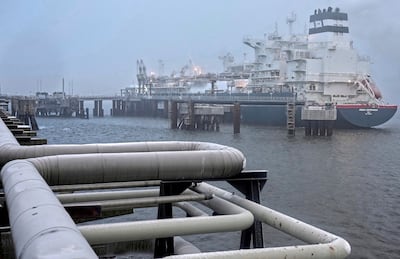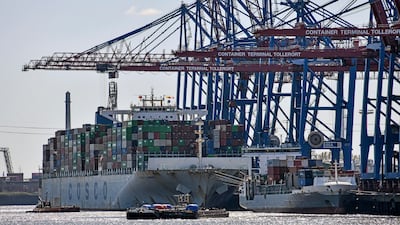Germany expects to rely on imports for two thirds of its future green hydrogen supply, opening the door for exporters in the developing world as well as partners such as the UAE.
Berlin is looking to a range of suppliers after relying on Russian gas left it exposed when Moscow invaded Ukraine.
A 2020 hydrogen strategy is being revised as ministers look to the clean fuel, currently produced in small and expensive quantities, to replace fossil fuels in sectors such as shipping and aviation.
A specific hydrogen import strategy is also being drawn up.
It is understood the new strategy will not name preferred sellers but talks on hydrogen have been held with several countries and formed part of an energy agreement between Germany and the UAE last year.
It will then be up to the private sector to build on such agreements by negotiating deals to import hydrogen to Germany.
A first test shipment of ammonia, a hydrogen compound, was last year sent from the UAE to the German port of Hamburg.
Green hydrogen, as it is known when produced using renewable means such as solar or wind energy, does not produce carbon dioxide when burned as fuel.
In talks with countries such as Namibia, a former German imperial possession, Berlin has stressed that it wants those nations to benefit from the trade.
“We need to ensure that countries with favourable conditions for hydrogen production can also use this opportunity to improve their own well-being,” said Norbert Gorissen, a climate envoy at Germany's Foreign Ministry.
“Especially in current times, it's important to note that the manifold sources of hydrogen and renewables makes them less likely tools of political coercion.
“We must not forget the foreign policy dimension of that coming brave new hydrogen world.”

Germany hopes a future trade in hydrogen will add a positive bent to its relations with various countries, Mr Gorissen told an event in Bonn, which is hosting global climate negotiations in the run-up to Cop28 in Dubai.
“We here in Germany will cover around one third of our expected demand from domestic production,” he said.
“The rest needs to come from abroad and we can only do that in partnership. This offers enormous opportunities for potential exporting countries around the globe.”
German Chancellor Olaf Scholz has talked up the prospect that newly built gas terminals to replace Russian fossil fuel links could one day be used for hydrogen.
In addition to high hopes for manufacturing and long-distance transport, there are pilot projects under way across Europe involving hydrogen powering buses, lorries and private cars.
The EU aims to produce 10 million tonnes of green hydrogen within the bloc and import the same amount by 2030.


